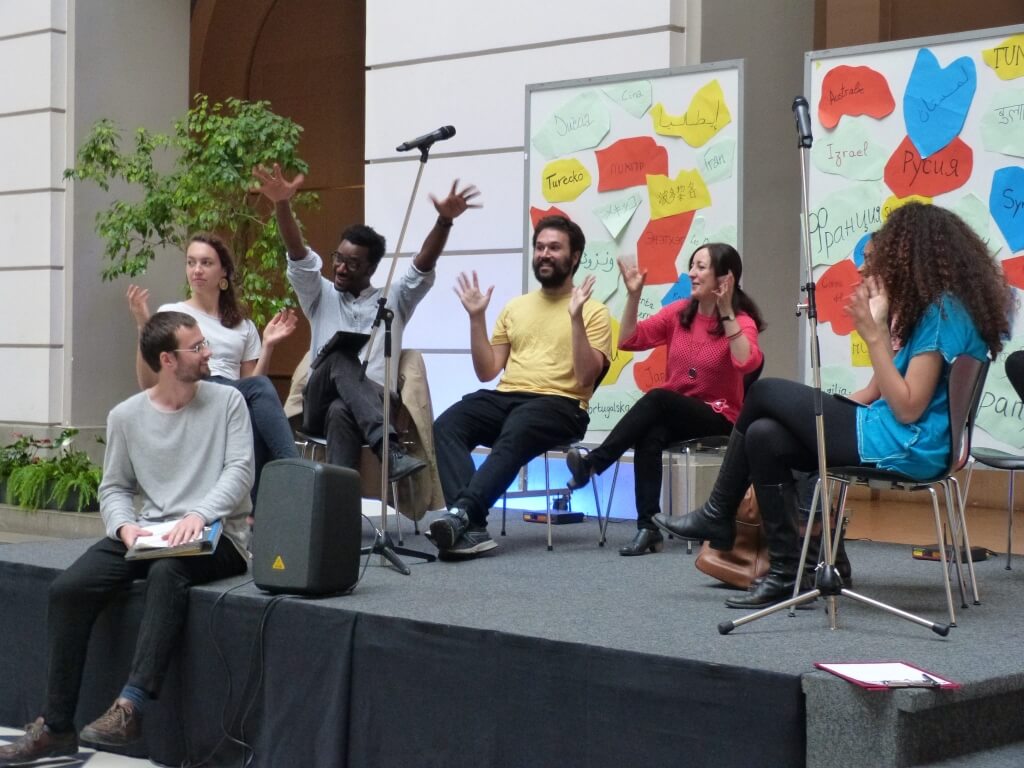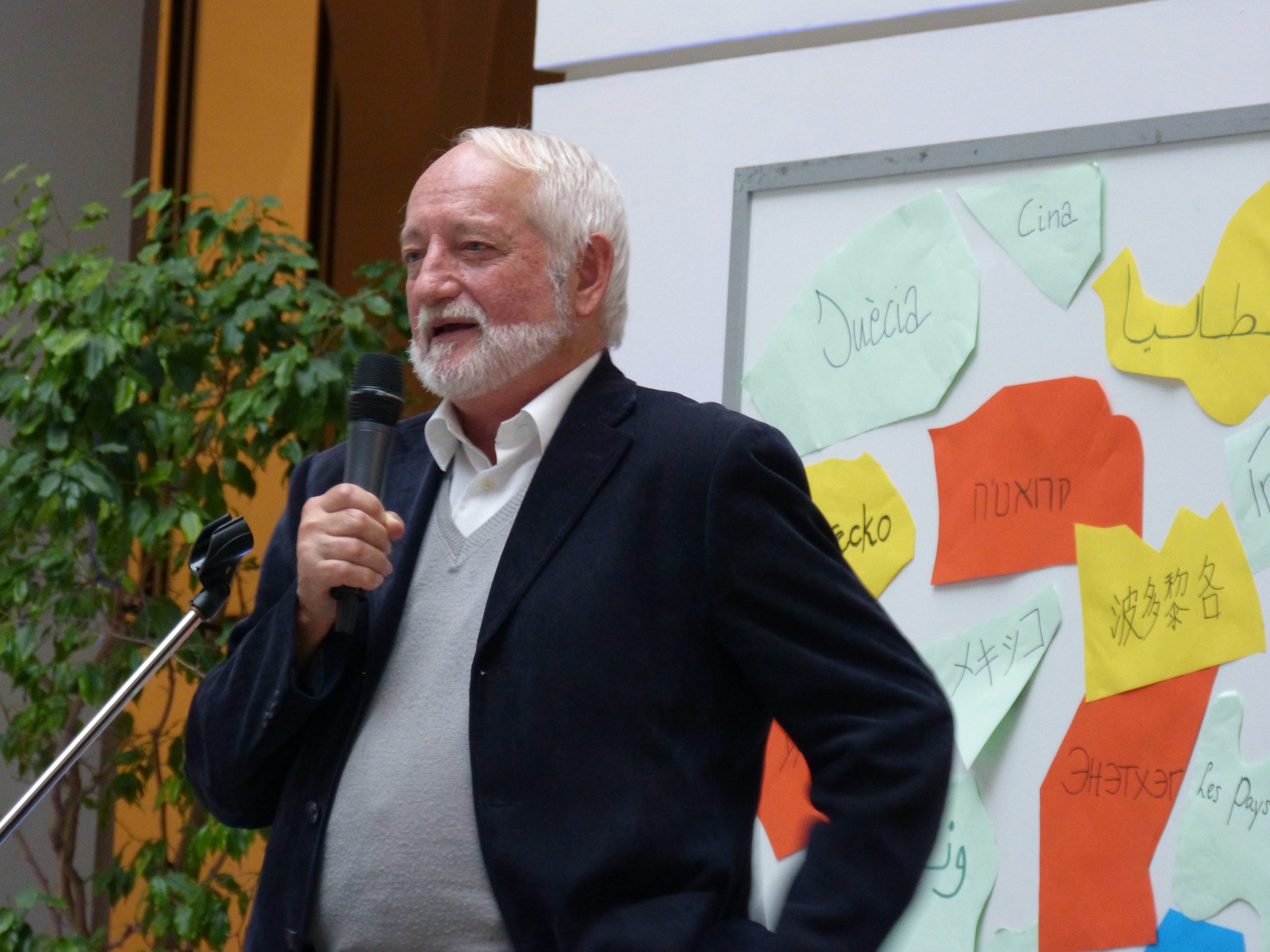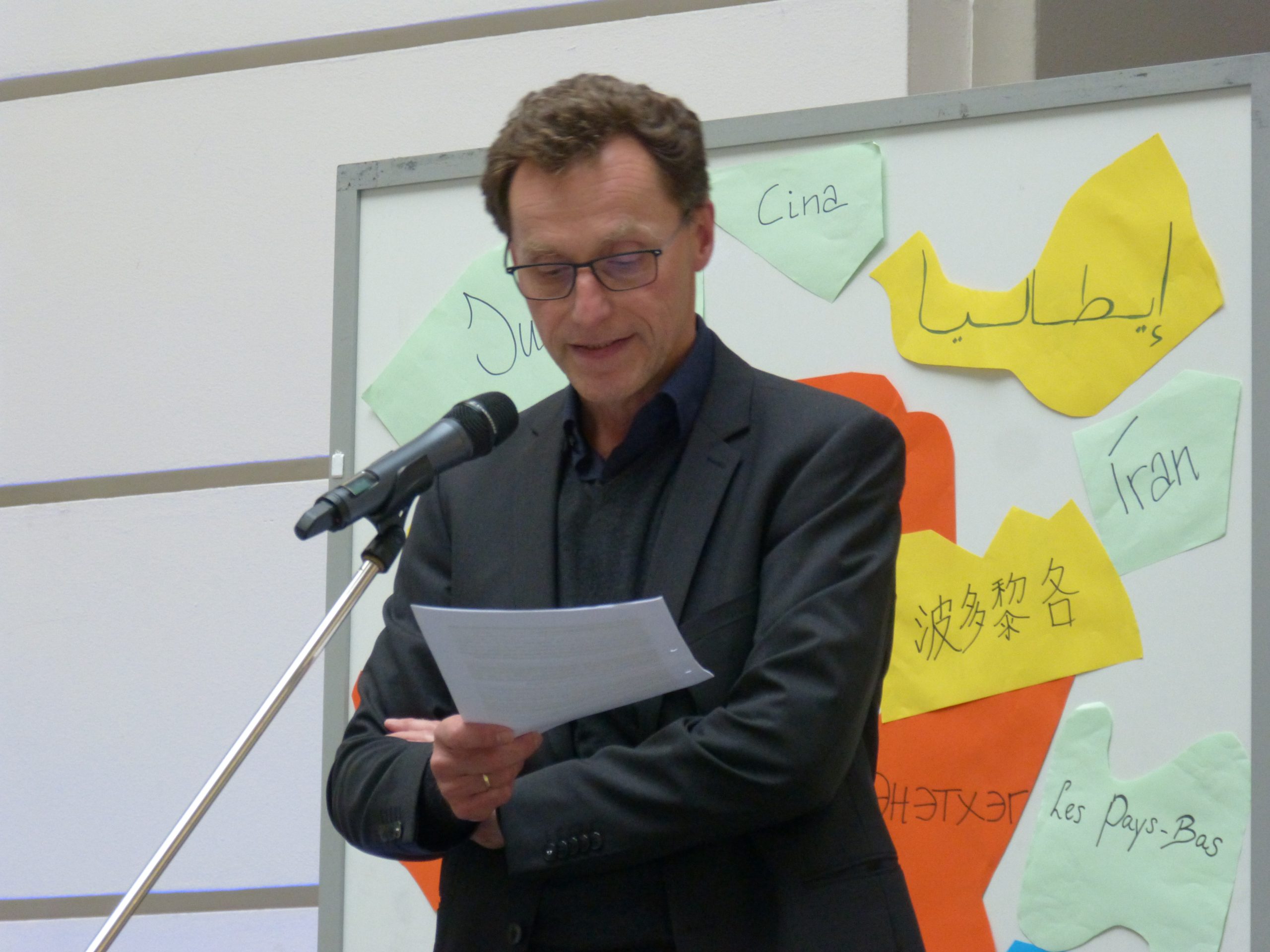The SKB - a (hi)story with ups and downs

In 2019, the SKB celebrated its 30th birthday, which means it is now older than some of its members.
Winter semester 1988/89: How it all began ...
All over Berlin, students at universities were on strike, protesting for better study conditions and more opportunities for student co-determination. In the course of the big student strike, many new student groups and initiatives were also formed at the TU.
At the time, foreign students already made up about 20 percent of the TU's total - but they were hardly present in the strike activities. To change this, some students from different countries joined forces. Their idea: to teach each other their own languages in order to get to know each other better and gain insights into other cultures. By giving and taking collectively, teaching and learning from one other should awaken a sense of "us" between students from all over the world.
In 1989, the Language and Culture Exchange - Sprach- und Kulturbörse, SKB for short - was founded at the Institute of Sociology. The first "language groups" took place during the winter semester break, where native speakers gave an insight into the language and cultures of their countries of origin. The students organized "cultural evenings" where they listened to lectures, discussed, ate, danced and partied together.
From the beginning, the SKB's motto has been: "More than learning languages together."
The first years: improvisation and consolidation at the TU
"It was the time shortly after the fall of the Wall, a new beginning, new encounters... New approaches were tried out, which then slowly but noticeably spread throughout the Berlin university landscape. In addition, the idea of the European Union was slowly being put into practice. As a result, the demand for languages, cultural knowledge and intercultural communication as key competencies grew more and more. We as SKB wanted to make our contribution to integration by offering our languages and insights into our cultures."
(Michelle Krapf-Bangera, English teacher and SKB member since 1990)
The concept of the Language and Culture Exchange was working. The number of language courses was growing, as was the range of leisure and cultural activities. The students even organised joint language trips to the Baltic Sea. As the demand for language learning opportunities grew, so did the project itself. The student initiative became a registered association. Soon the SKB was so successful that its members could no longer support the organisation just with their voluntary commitment.
Some SKB members contacted Ulrich Steinmüller - then Professor of Foreign Language Didactics - and presented the project to him. It was a success: In 1993, the SKB was established as a study reform project at the Institute for Subject Didactics. Professor Steinmüller supported the project with his professional expertise until his retirement.
From then on, the SKB was an official part of the TU and would receive four half-time tutor positions. SKB members elected four people among themselves to take these positions and in that time take care of the project's coordination. The SKB coordination team - K-Team for short - was born. To this day, the K-Team consists of tutors and is an important organ for the student self-administration of the project, alongside the SKB plenum (the plenary assembly) and the language and working groups.

Prof. Ulrich Steinmüller at the SKB's 30th anniversary celebration on Oct. 18, 2019.
The SKB at the turn of the millennium: The project grows and grows
With the connection to the TU, the SKB could continue to grow: at this point the project had over 100 members, up to 35 different languages were taught, including rarely offered languages such as Icelandic, Lithuanian or Mongolian. From 2004 to 2011, an average of 300 to 400 language courses were taught per semester, in which about 3000 students learnt.
Despite the ever increasing professionalization of the language programme, the SKB retained and retains its character as a self-governing, grassroots-democratic and solidary student project: at the monthly plenums, SKB members discuss together and decide everything by vote. The language groups organise themselves decentrally. Various work groups take care of organisational tasks - for example, advertising, the cultural programme or further training for members. The K-Team, elected by the plenum, supervises finances and coordinates cooperation with the university.
Each semester, the members decide how much the fee for the language courses will be and how much money the working groups will receive - depending on the total income. One thing is sure: all teachers receive the same compensation, regardless of whether they teach a course with 4 or 14 participants. In fact, the income from courses that are in high demand helps to finance courses that are less well attended. Thanks to this solidarity-based model, the SKB has been able to offer a broad and diverse range of language courses over many years, the variety of which is, to this day, unique in the German landscape of higher education.
The most important didactic principles remain learning at eye level and an alignment of the course content with the learners' needs and interests. The SKB is never solely a language centre, but also always a place for cultural encounters and exchange.
20 years of SKB - Is that it, then?
"Showcase project of the TU endangered. Language exchange starts stammering." (taz, 6/9/2011)
With the retirement of Prof. Dr. Steinmüller in 2008, the SKB lost a long-time companion and supporter who had often successfully represented the interests of the student project in the committees and institutions of the university. Since there initially was no successor for the professional and administrative support of the SKB, the TU terminated its target agreement with the SKB in 2010, which, among other things, had allowed the use of classrooms for the language courses and financed the tutor positions. The SKB was thus effectively on the brink of extinction.
This serious crisis showed the strength of the project: the members were not ready to give the SKB up so easily. For months they discussed, mobilized and negotiated. Concepts were developed, press releases written, allies sought - with success: in October 2011, the AStA of the TU (General Student Committee) temporarily took on responsibility for the SKB. Rescue came at the last minute. The language courses could take place again in the winter semester. After lengthy negotiations, the SKB and the TU finally agreed on a new target agreement in 2012: The SKB would be supported by the ZEWK (Central Institute for Scientific Continuing Education and Cooperation), course and office rooms could be used again, the tutor positions would continue to be paid.
The crisis didn't leave the SKB unscathed. The new target agreement meant that in future only students, TU alumni and members of Berlin's universities would be allowed to attend the courses. Previously, the courses were open to anyone interested, whether job-seeking, employed, freelance or retired. The SKB's self-image as an open, integrative, cross-cultural and cross-generational space suffered a noticeable setback as a result of this regulation.
Since 2014: A new beginning
In the meantime, the SKB has been firmly re-established as a self-governing student project at the TU. Since 2014, the project now reports directly to the Vice President for Studies and Teaching, Teacher Education and Continuing Education - currently represented by Christian Schröder. The technical supervision of the SKB lies with Prof. Dr. Thorsten Roelcke, head of the Department of German as a Foreign and Specialized Language, and thus back in language-didactic hands. Thanks to the constructive and trusting cooperation at eye level with Prof. Roelcke, there is now closer cooperation between the SKB, the department and other language institutes such as the ZEMS (Central Institute for Modern Languages) at the TU.
"As far as the conveyance of language (and culture) is concerned, the Language and Culture Exchange on the one hand and the Central Institute for Modern Languages, the ZEMS on the other go different ways. It seems particularly important to me that both are not perceived as competing with each other, but as independent institutions with their specific programmes." (Prof. Dr. Thorsten Roelcke, 2019 on the occasion of the SKB's 30th anniversary)

Prof. Thorsten Roelcke at the SKB's 30th anniversary celebration on Oct. 18, 2019.
Today - looking forwards
Inzwischen ist die SKB mehr als 35 Jahre alt. Das Projekt hat zwischen 70 und 90 Mitgliedern aus fast 40 Ländern. Einige Mitglieder der ersten Jahre sind noch immer dabei, viele andere sind in den letzten Jahren neu dazugekommen. Sie alle tragen dazu bei, dass die SKB sich ständig weiterentwickelt, dass wir voneinander lernen, neue und innovative Wege ausprobieren und besser werden, in dem, was wir tun.
And despite all the ups and downs, the SKB has always remained true to itself and its self-image as a place of diversity, meeting at eye level, solidarity and grassroots self-organisation.
True to this day: SKB - more than learning languages together!
Are you interested in writing SKB (hi)story too? Then take a look at our Internship and involvement page. We are looking for support almost every semester.